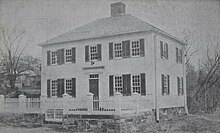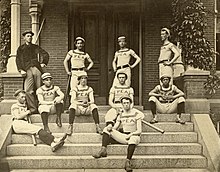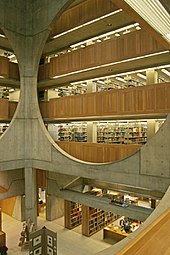Phillips Exeter Academy
He made his fortune as a merchant and banker, and gained influence over time as an advisor to the colonial governor, circuit court judge, elected representative, and senior militia officer in the years leading up to the Revolutionary War.[6] John Phillips stipulated in Exeter's founding charter that it would "ever be equally open to youth of requisite qualifications from every quarter.[15][16] Although originally, most Exeter graduates did not go on to further formal education (as with most 18th and 19th Century secondary schools), the ones that did placed at Harvard in substantial numbers.[18] In the latter half of the 19th century, graduates of Exeter and the now-defunct Adams Academy of Quincy, Massachusetts were "dominant socially" on Harvard Yard.[19] Exeter's first recorded minority student was Moses Uriah Hall, a young Black man, who entered the Academy in 1858, served in the Union Army during the Civil War, and was known for many years as a skilled stonemason and businessman in nearby Epping, New Hampshire.[20] Exeter's official records indicate that six years later, five White students from a border state, Kentucky, threatened to leave the Academy because another young Black man had enrolled as a member of their class.[33] From 1879 to 1881, Exeter (and several other schools) participated in the Chinese Educational Mission, hosting students from Qing China who were sent to the United States to learn about Western technology.Although his early years were marked by grave financial difficulties, including a $200,000 bill to rebuild the Academy Building (destroyed by fire five months into Perry's administration) and the disruption of World War I,[35] he had a "talent for getting wealthy men to part with their money.[38] In 1936, Exeter boasted an $8 million endowment for roughly 700 students, making it the richest boarding school in New England in both absolute and per capita terms.Perry's largest financial windfall came on April 9, 1930, when philanthropist and oil magnate Edward Harkness wrote to Perry to propose a new way of teaching and learning, for which Harkness would donate funds to foot the bill:What I have in mind is a classroom where students could sit around a table with a teacher who would talk with them and instruct them by a sort of tutorial or conference method, where each student would feel encouraged to speak up.[45]The result was "The Harkness Method," in which a teacher and a group of students work together, exchanging ideas and information in a seminar setting.[38] In addition, through Harkness' largesse, the academy was able to avoid cutting faculty salaries during the Great Depression, making it a rarity among boarding schools.Exeter served as one of the testing grounds for the Advanced Placement program,[51] and in 1957, it produced 11 of the 30 incoming Harvard students with enough AP credit to enter as sophomores.[52]) Due to a surge of applicants from public schools, Exeter students no longer enjoyed near-automatic admission to the colleges of their choice.[60] He is the fourth alumnus of Exeter to serve as Principal, after Gideon Lane Soule (1838–1873), Harlan Amen (1895–1913), and William Saltonstall (1946–1963).In 2021, Rawson announced that Exeter would adopt a need-blind admissions policy, following a $90 million fundraising campaign to support financial aid.[61] In the later half of the 20th century, criteria for U.S. college and university admissions evolved to include more meritocratic considerations and an emphasis on wider demographic factors.Dartmouth) and MIT between the years 2022-24, 10 or more students also attended Boston College, Bowdoin, GWU, Georgetown, NYU, Northeastern, Tufts, UChicago, USC, and Wesleyan.[79][80] Exeter also participates in the Milton Academy Mountain School program,[81] which allows students to study in a small rural setting in Vershire, Vermont.Basketball, water polo, wrestling, swimming, cycling, soccer, squash, cross country, crew, and ice hockey teams have won recent New England championships.Georgia Gould is an Olympic medalist in mountain biking, while Joy Fahrenkrog is a member of the United States Archery Team.It accommodates worship for "twelve religious traditions including Christian, Muslim, Jewish, Hindu, Quaker, Buddhist, Catholic among others"[125] as well as Secular Humanism.A renovation of Phillips Church, completed in 2002, provided spaces for worship and meditation for students of diverse religious persuasions.[130][131] Exeter has two chief symbols: a seal depicting a river, sun and beehive, incorporating the academy's mottos; and the Lion Rampant.Early alumni of Exeter include US Senator Daniel Webster (1796);[133] John Adams Dix (1809)[134] a Secretary of the Treasury and Governor of New York; US President Franklin Pierce (1820);[135] physician and founder of Sigma Pi Phi Henry McKee Minton (1851); Abraham Lincoln's son and 35th Secretary of War Robert Todd Lincoln (1860);[136] Ulysses S. Grant, Jr. (1870);[137] Richard and Francis Cleveland;[138] "grandfather of football" Amos Alonzo Stagg (1880);[139] Pulitzer Prize-winning author Booth Tarkington (1889)[140] and Hugo W. Koehler (1903), American naval attache' and intelligence agent during the Russian Revolution.[143] Other alumni noted for their work in government include Gifford Pinchot,[144] Lewis Cass,[145] Judd Gregg,[146] Jay Rockefeller,[147] Kent Conrad,[148] John Negroponte,[149] Bobby Shriver,[150] Robert Bauer[151] and Peter Orszag.[152] Alumni notable for their military service include Secretary of Navy George Bancroft, Benjamin Butler,[153] and Charles C.[154] Authors George Plimpton,[155] John Knowles,[143] Gore Vidal,[156] John Irving (whose stepfather taught at Exeter),[157] Robert Anderson,[158] Dan Brown (whose father taught at Exeter),[159] Peter Benchley,[160] James Agee,[161] Chang-Rae Lee,[162] Debby Herbenick,[163] Stewart Brand,[164] Norb Vonnegut,[165] and Roland Merullo[166] also attended the academy.Other notable alumni include businessmen Stockton Rush, Joseph Coors,[167] Michael Lynton,[168] Tom Steyer,[169] Mark Zuckerberg,[170] David Goel,[171] and Stephen Mandel;[172] lawyer Bradley Palmer;[173] entrepreneur and presidential candidate Andrew Yang,[174] journalist Drew Pearson,[175] Dwight Macdonald,[176] producer and entrepreneur Lauren Selig, James F. Hoge, Jr.,[177] Paul Klebnikov,[178] Trish Regan,[179] Suzy Welch,[180] and Sarah Lyall;[181] actors Michael Cerveris,[182] Catherine Disher,[183] Jack Gilpin,[184] and Alessandro Nivola;[185] film director Howard Hawks;[186] musicians Phil Wilson,[187] Bill Keith,[188] Benmont Tench,[189] China Forbes,[190] Ketch Secor,[191] Win Butler[192] and William Butler;[193] historians Robert Cowley,[194] Arthur Schlesinger, Jr.,[195] and Brooks D. Simpson;[196] writers Roxane Gay[197] and Joyce Maynard;[198] screenwriters Tom Whedon[199] and Tom Mankiewicz;[200] baseball players Robert Rolfe[201] and Sam Fuld;[202] educators Claudine Gay,[203] Jared Sparks[204] and Benno C. Schmidt, Jr.;[205] composer Adam Guettel;[206] musician and podcaster Hrishikesh Hirway, humorist Greg Daniels;[207] mathematicians Shinichi Mochizuki,[208] David Mumford,[209] and Lloyd Shapley, winner of the 2012 Nobel Prize in economics;[210] economist Paul Romer, winner of the 2018 Nobel Prize in economics,[211] computer scientist Adam D'Angelo (co-founder of Quora);[212] and philosopher Daniel Dennett.In 1952, Exeter, Andover, Lawrenceville, Harvard, Princeton and Yale published the study General Education in School and College: A Committee Report.






Exeter, New HampshireIndependentboardingcollege preparatoryNonsectarianJohn PhillipsPrincipalCoeducationalSuburbanNEPSACPhillips Academy (Andover)The ExonianEight Schools AssociationG30 SchoolsTen Schools Admission Organizationco-educationalcollege-preparatory schoolpostgraduatefinancial endowmentworld's largest high school libraryneed-blind basislist of notable alumniFranklin PierceDaniel WebsterFacebookMark ZuckerbergNobel PrizeList of Phillips Exeter Academy principalsJohn and Elizabeth PhillipsSamuel Phillips Jr.Phillips AcademyAndover, Massachusettsa friendly and historic rivalryNew Hampshire GovernorJohn Taylor GilmanNicholas GilmanU.S. Constitutionsacred musicWilliam WoodbridgeUnitarianCalvinistBoston Latin SchoolAdams AcademyEpping, New HampshireGideon Lane SouleCharles Everett FishHarlan Page AmenChinese Educational MissionQing ChinaLewis PerryWorld War IDavid LambGeorge PlimptonEdward S. HarknessEdward HarknessGreat DepressionHarkness TableWilliam SaltonstallJ. P. MorganThomas W. LamontAdvanced PlacementKendra Stearns O'DonnellHarlan Amenneed-blind admissionsBoston CollegeBowdoinGeorgetownNortheasternUChicagoWesleyanHarkness TablesFrederick BuechnerMichael GolayTodd HearonWillie PerdomoInternational Mathematical OlympiadGwynneth CooganMarilinda GarciaNew Hampshire House of RepresentativesRichard W. DayMilton AcademyVershire, VermontGrenobleSaint PetersburgStratford-upon-AvonEleutheraTaichungGöttingenCuencaCallanRennesViterboZaragozaHispanicAmerican Indian/Alaska NativeTwo or more RacesNative Hawaiian/Pacific IslanderCOVID-19 pandemiclegacy studentsstudents of colorfinancial aidneed-blindInternal Revenue Servicestudent financial aidThe Class of 1945 LibraryRalph Adams CramarchaeologyanthropologyLamont GalleryClass of 1945 LibraryLouis KahnBrutalistAmerica's Favorite ArchitectureThe New York TimesAda Louise HuxtableHarkness systemCenterbrook Architects & PlannersAmerican Institute of ArchitectsBoston Society of ArchitectsGeorge H. Lovesquashswimming poolbasketballhockeyWilliam Boyce Thompsonwater polo
